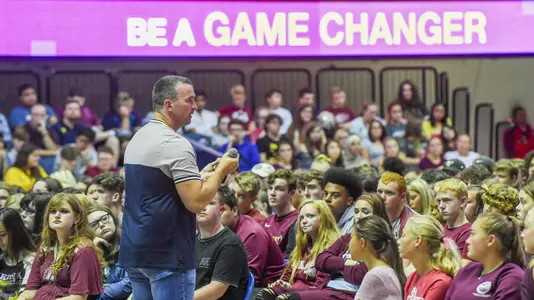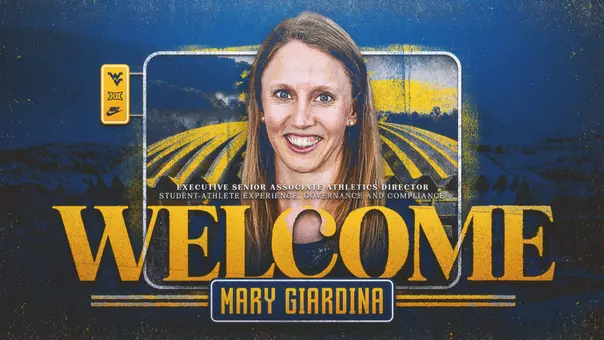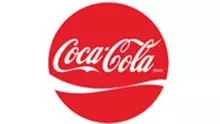
Photo by: All Pro Photography/Dale Sparks
WVU Coliseum Site of State’s First Opioid Awareness Summit
September 17, 2019 02:19 PM | General
MORGANTOWN, W.Va. – Last summer, Morgantown marketing specialist Joe Boczek was looking for ways to bring attention to the very serious matter of opioid abuse in West Virginia.
His idea was to somehow get nationally known motivational speaker Chris Herren involved because he heard Herren speak once to the youth basketball team his son played on and Herren's message really resonated with the kids.
Herren is a former basketball star whose promising college career at Boston College and Fresno State was derailed because of drug use. Since completing a professional basketball career overseas in 2006, Herren has dedicated his life to talking about substance abuse issues and his presentations have always been well received.
Boczek is a big thinker and he wanted this to be more than just a speech or two by some talented motivational speakers, however. His aim was to develop some sort of lasting program to raise awareness for the opioid crisis that has overtaken West Virginia.
So Joe worked with his local client MVB Bank and the WVSSAC (West Virginia Secondary School Activities Commission) to come up a program that schools in the state could embrace to address this serious issue.
And make no mistake, it is serious.
According to the National Institute on Drug Abuse, no state has been affected by opioid abuse quite like West Virginia. The Mountain State has the highest age-adjusted rate of opioid-related drug overdose deaths. In 2017 alone, there were 833 drug overdose deaths involving opioids in our state – a staggering rate of 49.6 deaths per 100,000 persons.
In the tiny town of Kermit, with a population of just 400, a major dug company once shipped more than three million prescription opioids to a single pharmacy there in a span of 10 months, according to a congressional report released last year.
Some are already referring the current opioid crisis as this generation's bubonic plague.
"The opioid situation is awful in our state – more than most people know, admit or even understand," Boczek said.
He wants to change this, with help of the state's two leading educational institutions.
Earlier today, West Virginia University's Coliseum was the host venue for the first-ever Opioid Awareness Summit. More than 4,000 high school students from the northern part of the state attended a two-hour presentation featuring Herren, Rhonda Sciortino and Shaun Derik.
Tomorrow, the same program will take place at Marshall University's Henderson Center for students in the southern part of the state.
Additionally, both programs are being made available via livestream to middle schools and high schools throughout the state as a part of the regular curriculum, which Boczek estimates will reach another 130,000 students.
"The SSAC was the key to making this happen because they have the ability to reach all of the schools," Boczek said.
All three speakers have different messages with the same goal – to raise awareness about the evils of drug addiction. West Virginia Gov. Jim Justice and West Virginia University president E. Gordon Gee provided welcoming messages today and Marshall University president Jerome A. Gilbert will do the same tomorrow.
"What we've tried to do is to cover different aspects," Boczek explained. "We've got an athlete in Chris Herren. Rhonda Sciortino grew up in a home with both of her parents being addicts but she overcame that to become a multimillionaire insurance agent who has since retired to devote more her time to making people aware of the opioid crisis that we have in our country right now."
New York city performing artist Shaun Derik concluded the two-hour event with an uplifting message of song and dance he calls "Dreams and Detours."
"We want to educate them while we entertain them," Boczek explained. "It's really a quick two hours because we kept them engaged.
"You don't have to be on opioids to be affected by this," he continued. "There are a lot of kids who will attend one of these two events who will never touch an opioid, but will still be dramatically affected because their parents, guardians or loved ones are. They may not have anyone to help them with their homework or provide steady meals for them to eat throughout the day."
Boczek said today's presentation at the WVU Coliseum and tomorrow's event at the Henderson Center are just the beginning, only a kickoff if you will.
"There is a long game to play and this is a long game," he said. "After this we're going to promote the programs currently available through the DHHR (West Virginia Department of Health and Human Resources) in prevention, education and employment to try attack this on many different fronts.
"We're doing this under the mantra of being a game changer," he added. "We have the hashtag #Gamechanger and a website wvgamechanger.com. It's also important for people to realize that game changers don't have to be people who play sports, or sing and dance.
"It can be anyone."
Boczek mentioned the vital assistance he's received so far from the West Virginia Department of Education, Reclaim West Virginia, the West Virginia Department of Health and Human Resources and other state agencies.
Countless volunteers from church and civic groups in Morgantown and Huntington have been extremely helpful as well.
Boczek also personally expressed his gratitude to West Virginia University director of athletics Shane Lyons and Marshall University director of athletics Mike Hamrick for their help in making the two basketball arenas available to put on this event.
"Everyone at West Virginia University and Marshall University has been great," Boczek concluded.
His idea was to somehow get nationally known motivational speaker Chris Herren involved because he heard Herren speak once to the youth basketball team his son played on and Herren's message really resonated with the kids.
Herren is a former basketball star whose promising college career at Boston College and Fresno State was derailed because of drug use. Since completing a professional basketball career overseas in 2006, Herren has dedicated his life to talking about substance abuse issues and his presentations have always been well received.
Boczek is a big thinker and he wanted this to be more than just a speech or two by some talented motivational speakers, however. His aim was to develop some sort of lasting program to raise awareness for the opioid crisis that has overtaken West Virginia.
So Joe worked with his local client MVB Bank and the WVSSAC (West Virginia Secondary School Activities Commission) to come up a program that schools in the state could embrace to address this serious issue.
And make no mistake, it is serious.
According to the National Institute on Drug Abuse, no state has been affected by opioid abuse quite like West Virginia. The Mountain State has the highest age-adjusted rate of opioid-related drug overdose deaths. In 2017 alone, there were 833 drug overdose deaths involving opioids in our state – a staggering rate of 49.6 deaths per 100,000 persons.
In the tiny town of Kermit, with a population of just 400, a major dug company once shipped more than three million prescription opioids to a single pharmacy there in a span of 10 months, according to a congressional report released last year.
Some are already referring the current opioid crisis as this generation's bubonic plague.
"The opioid situation is awful in our state – more than most people know, admit or even understand," Boczek said.
He wants to change this, with help of the state's two leading educational institutions.
Earlier today, West Virginia University's Coliseum was the host venue for the first-ever Opioid Awareness Summit. More than 4,000 high school students from the northern part of the state attended a two-hour presentation featuring Herren, Rhonda Sciortino and Shaun Derik.
Tomorrow, the same program will take place at Marshall University's Henderson Center for students in the southern part of the state.
Additionally, both programs are being made available via livestream to middle schools and high schools throughout the state as a part of the regular curriculum, which Boczek estimates will reach another 130,000 students.
"The SSAC was the key to making this happen because they have the ability to reach all of the schools," Boczek said.
All three speakers have different messages with the same goal – to raise awareness about the evils of drug addiction. West Virginia Gov. Jim Justice and West Virginia University president E. Gordon Gee provided welcoming messages today and Marshall University president Jerome A. Gilbert will do the same tomorrow.
"What we've tried to do is to cover different aspects," Boczek explained. "We've got an athlete in Chris Herren. Rhonda Sciortino grew up in a home with both of her parents being addicts but she overcame that to become a multimillionaire insurance agent who has since retired to devote more her time to making people aware of the opioid crisis that we have in our country right now."
New York city performing artist Shaun Derik concluded the two-hour event with an uplifting message of song and dance he calls "Dreams and Detours."
"We want to educate them while we entertain them," Boczek explained. "It's really a quick two hours because we kept them engaged.
"You don't have to be on opioids to be affected by this," he continued. "There are a lot of kids who will attend one of these two events who will never touch an opioid, but will still be dramatically affected because their parents, guardians or loved ones are. They may not have anyone to help them with their homework or provide steady meals for them to eat throughout the day."
Boczek said today's presentation at the WVU Coliseum and tomorrow's event at the Henderson Center are just the beginning, only a kickoff if you will.
"There is a long game to play and this is a long game," he said. "After this we're going to promote the programs currently available through the DHHR (West Virginia Department of Health and Human Resources) in prevention, education and employment to try attack this on many different fronts.
"We're doing this under the mantra of being a game changer," he added. "We have the hashtag #Gamechanger and a website wvgamechanger.com. It's also important for people to realize that game changers don't have to be people who play sports, or sing and dance.
"It can be anyone."
Boczek mentioned the vital assistance he's received so far from the West Virginia Department of Education, Reclaim West Virginia, the West Virginia Department of Health and Human Resources and other state agencies.
Countless volunteers from church and civic groups in Morgantown and Huntington have been extremely helpful as well.
Boczek also personally expressed his gratitude to West Virginia University director of athletics Shane Lyons and Marshall University director of athletics Mike Hamrick for their help in making the two basketball arenas available to put on this event.
"Everyone at West Virginia University and Marshall University has been great," Boczek concluded.
United Bank Playbook: Colorado Preview
Friday, January 16
Mark Kellogg & Jordan Harrison | TCU
Thursday, January 15
White Throwback Uniform Reveal
Thursday, January 15
Ross Hodge | Houston Postgame
Wednesday, January 14















